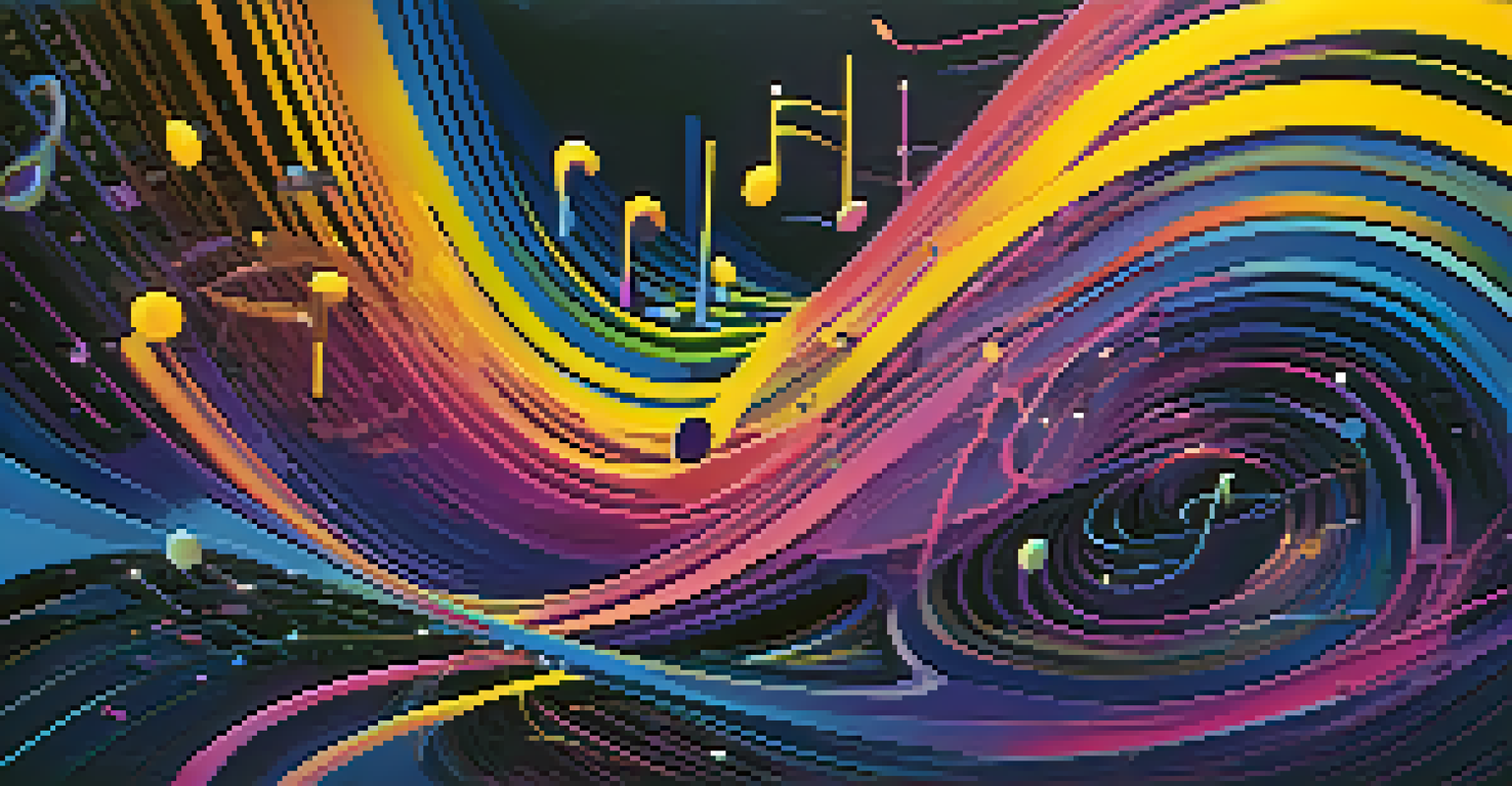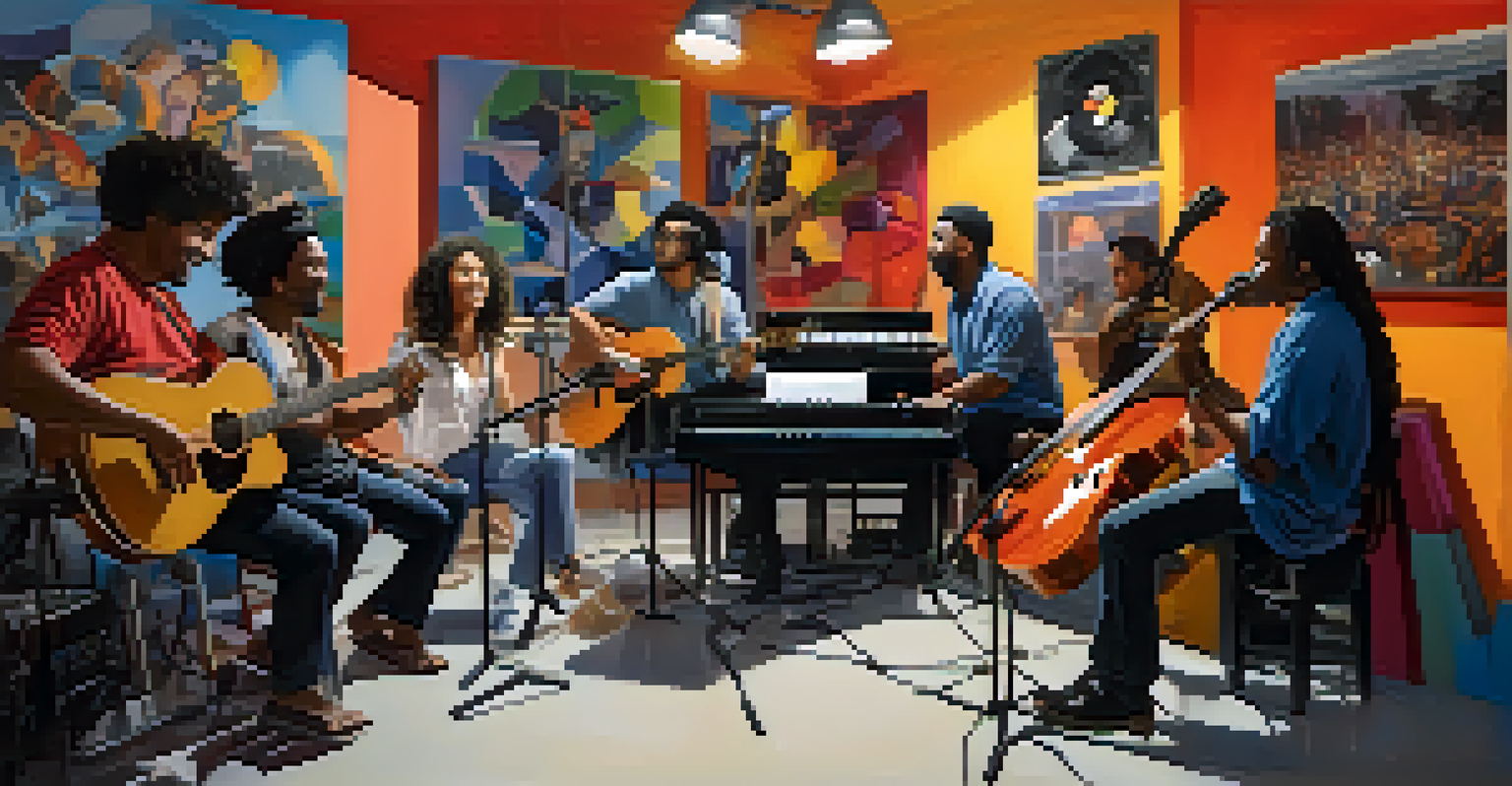The Impact of Music Algorithms on Artistic Expression

Understanding Music Algorithms and Their Role
Music algorithms are automated systems that analyze and generate music based on patterns and preferences. They use data such as listening habits and genre trends to create personalized playlists or even original compositions. This technology has revolutionized how we access and experience music, making it more tailored to individual tastes.
Music is the shorthand of emotion.
While many celebrate the convenience of music algorithms, there's an ongoing debate about their impact on creativity. Artists often wonder if these systems enhance or hinder their artistic expression. By analyzing listener preferences, algorithms can sometimes steer musicians towards more commercially viable sounds, potentially stifling innovation.
Ultimately, understanding music algorithms is crucial for both listeners and creators. It opens up discussions about the intersection of technology and artistry, prompting us to consider how much influence these tools should have on the creative process.
The Positive Effects of Music Algorithms on Artists
One of the most significant benefits of music algorithms is their ability to help artists reach wider audiences. By suggesting tracks to listeners based on their preferences, these algorithms can expose new fans to an artist’s work. This increased visibility can lead to more opportunities for collaboration and growth.

Additionally, algorithms can provide valuable insights into listener behavior. Artists can analyze which songs resonate most with their audience, allowing them to refine their craft and create music that connects deeply with fans. This data-driven approach can lead to a more engaged and loyal fanbase.
Music Algorithms Enhance Discovery
Music algorithms help artists reach wider audiences by recommending their tracks to listeners based on preferences.
Moreover, many artists use algorithms as a tool for inspiration. By studying trending sounds and styles, musicians can find new directions for their work, blending their unique voice with popular elements. This synergy can lead to innovative music that both respects tradition and embraces modernity.
The Challenges Faced by Modern Musicians
Despite the benefits, music algorithms can pose challenges for artists trying to maintain their authenticity. The pressure to conform to popular trends can lead some musicians to sacrifice their unique sound for commercial success. This raises questions about the true essence of artistry in an algorithm-driven landscape.
Technology is best when it brings people together.
Furthermore, the reliance on streaming platforms and their algorithms can create a one-size-fits-all approach to music consumption. If artists feel compelled to cater to algorithmic preferences, they risk losing the diversity that makes music rich and vibrant. This homogenization can stifle creativity across the industry.
It's essential for musicians to navigate these challenges thoughtfully. Balancing commercial viability with artistic integrity requires a deep understanding of both their creative voice and the influences of technology. Finding this balance is crucial for sustaining a diverse musical landscape.
How Algorithms Influence Listener Perception
Music algorithms not only shape what we hear but also influence how we perceive music. For instance, when a song is recommended based on our past listens, we may develop a bias towards it simply because it aligns with our established preferences. This can create a feedback loop that reinforces certain genres or styles, often at the expense of others.
Moreover, the way algorithms curate playlists can affect our emotional response to music. If a playlist is designed to evoke specific feelings or memories, listeners might find themselves experiencing music in a more formulaic way. This can diminish the spontaneity and surprise that often accompany discovering new music.
Challenges of Authenticity for Artists
Despite their benefits, music algorithms can pressure artists to conform to trends, risking their unique sound and creativity.
Understanding this influence is vital for both artists and listeners. It prompts us to question how much of our musical tastes are genuinely our own versus shaped by algorithmic recommendations, encouraging a more conscious approach to music consumption.
The Future of Music Creation in the Age of Algorithms
As technology continues to evolve, the future of music creation is likely to be deeply intertwined with algorithms. Emerging tools are already enabling artists to collaborate with AI, generating music that blends human creativity with machine learning. This opens up exciting possibilities for innovation and experimentation in the music industry.
However, this shift also raises ethical questions about authorship and originality. If a piece of music is co-created with an algorithm, who owns the rights? Artists must navigate these complexities as they embrace new technologies while ensuring their creative contributions are recognized.
Ultimately, the future holds promise for a richer, more dynamic music landscape. By leveraging algorithms thoughtfully, artists can carve out new paths for expression while maintaining the essence of their artistry.
Navigating the Balance: Art and Technology
Finding the right balance between artistic expression and technological influence is a challenge that many musicians face today. It’s essential for artists to embrace technology as a tool rather than a crutch, allowing them to enhance their creativity without losing sight of their unique voice. This requires a conscious effort to engage with technology meaningfully.
Moreover, collaboration between artists and tech developers can lead to innovative solutions that respect artistic integrity. By working together, they can create tools that empower musicians rather than dictate their creative process. This collaborative approach can lead to a more vibrant and diverse musical landscape.
Fans Shape Music Trends
Fans play a vital role in influencing music trends and artists, as their engagement drives the algorithms that promote songs.
Ultimately, the key lies in understanding that technology should serve to amplify, not overshadow, artistic expression. By navigating this balance, musicians can thrive in a world increasingly shaped by algorithms.
The Role of Fans in Shaping Music Trends
Fans play a crucial role in shaping music trends, often driving the algorithms that influence what artists create. As listeners engage with platforms, their preferences help determine which songs gain popularity, creating a cycle of influence. This dynamic relationship highlights the importance of fan engagement in the music ecosystem.
Additionally, the rise of social media has empowered fans to express their opinions and share music with their networks. This grassroots approach can lead to unexpected hits and elevate lesser-known artists, proving that the audience’s voice is as vital as the artist’s. It showcases a collaborative effort between creators and consumers.

This evolving relationship between fans and artists demonstrates that music is a shared experience. Both parties contribute to the landscape, and as algorithms adapt to listener behavior, artists can find new ways to connect with their audience, fostering a deeper appreciation for artistic expression.